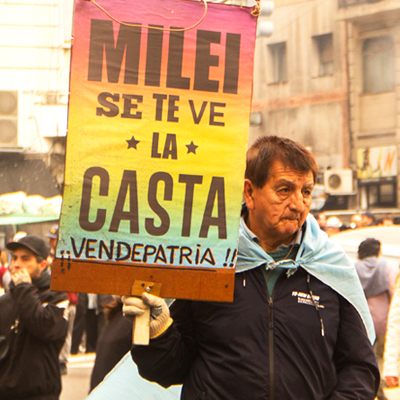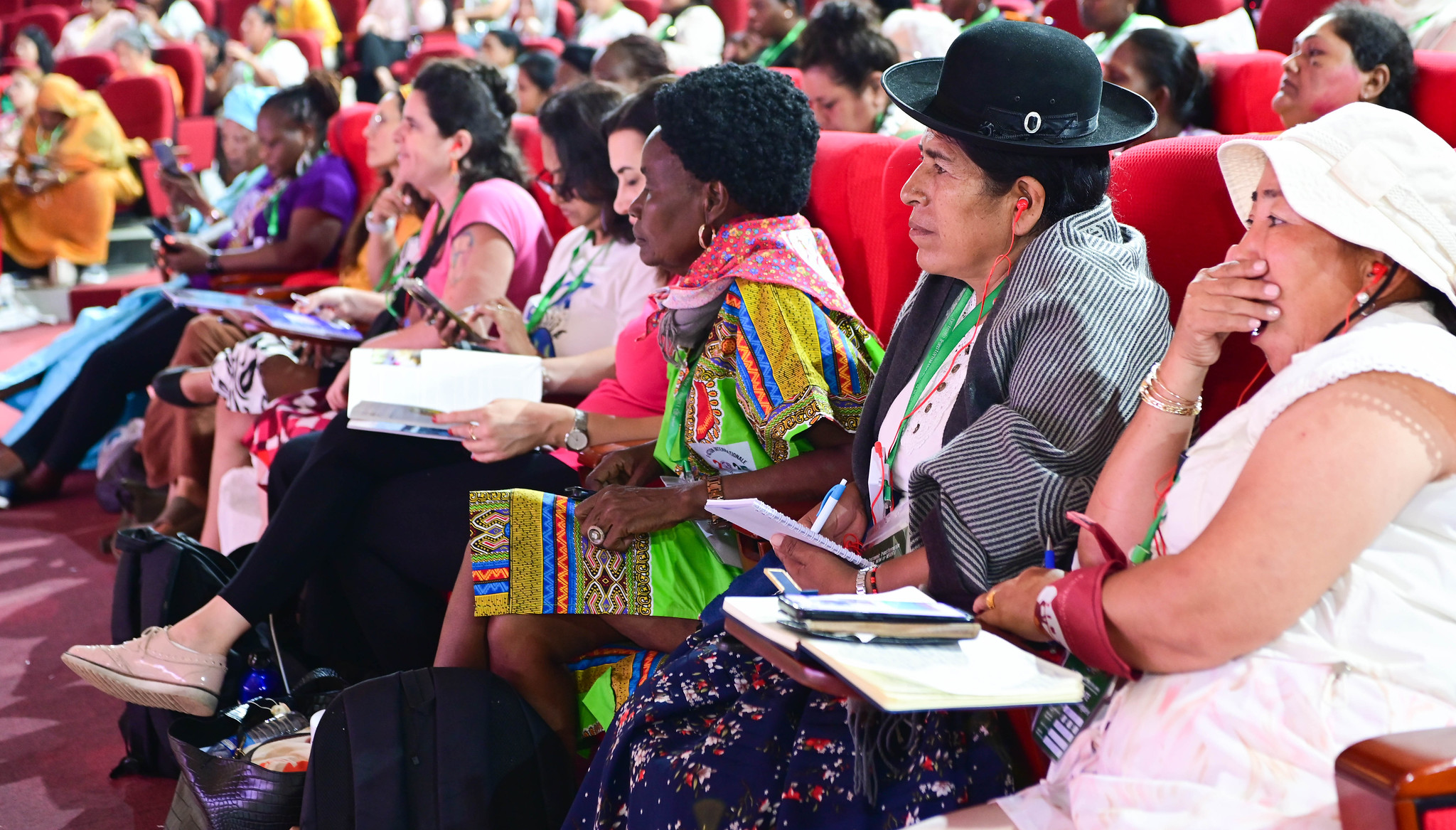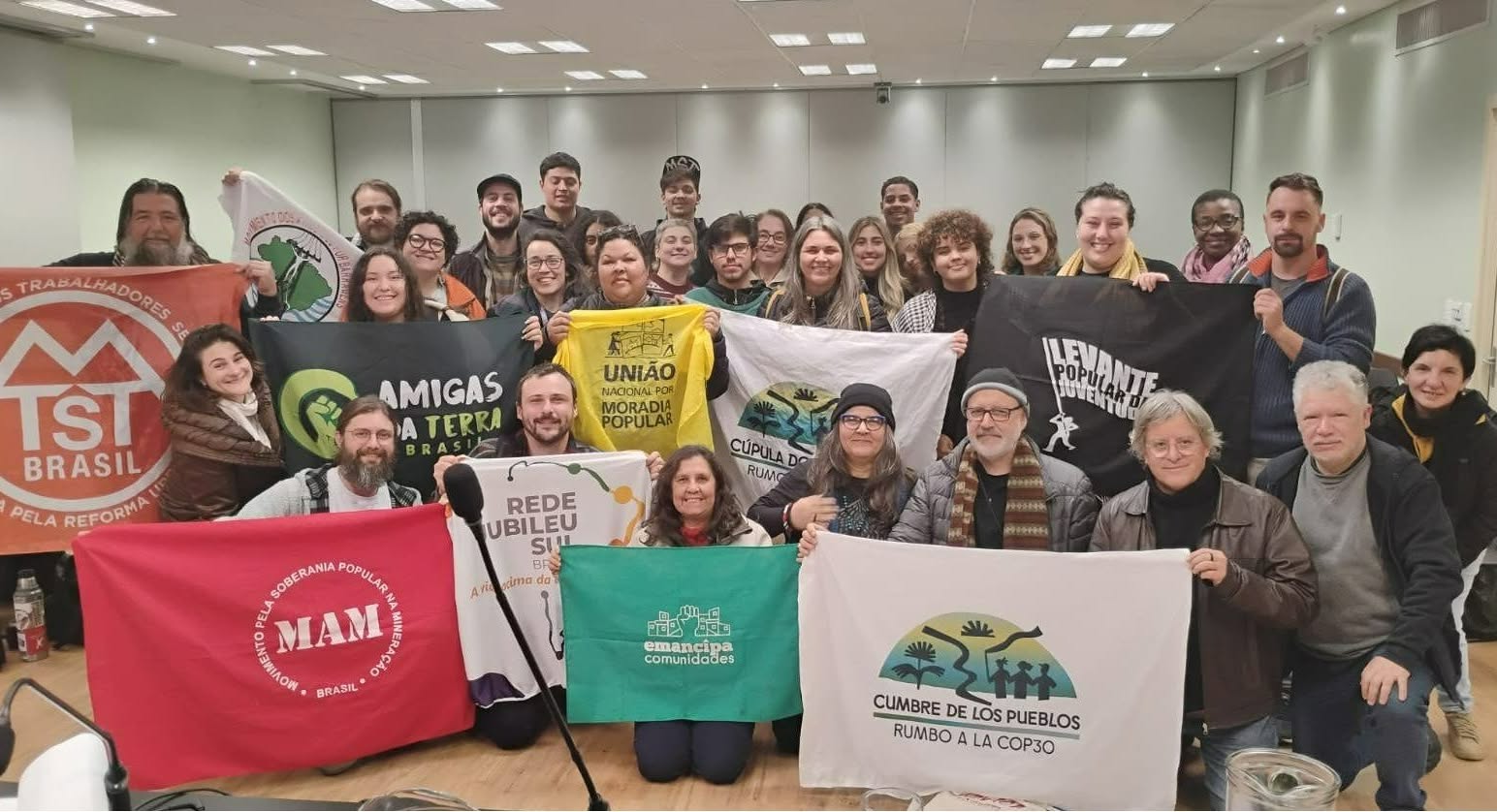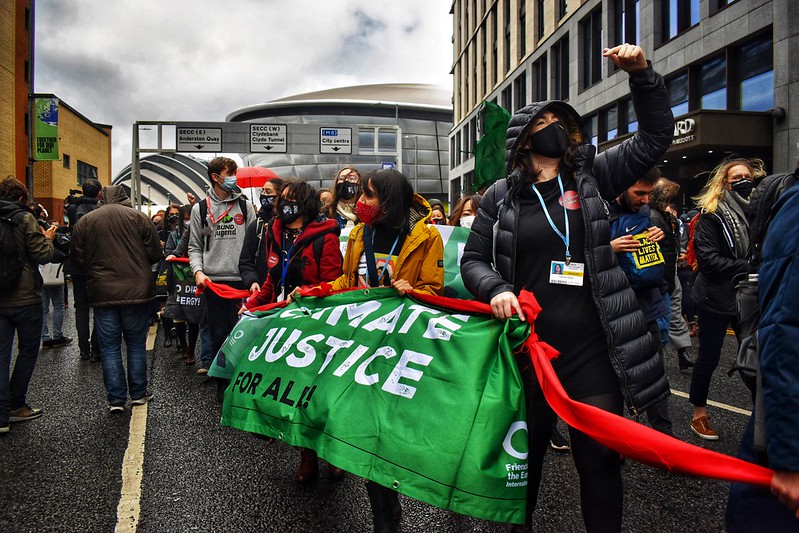Organising hatred and orchestrating misery
Argentina under Javier Milei´s administration: grassroots perspectives about the rise of the far right.

Javier Milei took office as President of Argentina on 10 December 2023. During this time, the far-right leader, an uncompromising defender of the free market and inciter of hate, imposed social cuts, persecuted demonstrators and used violence in different ways, showed himself subservient to Israel and the US, and began to build a new internal enemy: all people fighting for their rights. The ‘libertarian rebel’ applies new and old recipes framed within an exacerbated, but declining, neoliberalism. The new right-wing movements on the rise around the world bring novelty and continuity and share common ideas: organising hatred and orchestrating misery.
At the end of March, Tierra Nativa – Friends of the Earth Argentina organised a webinar together with the Internationalist Solidarity System of Friends of the Earth International to review some chapters of the fast-paced history of adjustments, deregulation and deepening of the corporate looting that the Argentinian people have been experiencing for over a year and four months. The webinar included presentations from six women activists from the grassroots sector. In this article we collect data, reflections and analyses from the webinar.
Fast and furious
The first actions of Milei’s administration set the course for what has been almost a year and a half under his mandate. In his first 20 days, Milei presented his first Necessity and Urgency Decree (DNU), the Incentive Regime for Large Investments (RIGI) and an omnibus law with more than 600 articles called ‘Law of bases and starting points for the freedom of the Argentinian people’ (which was passed, together with the RIGI, 6 months after it was presented). This law removes powers from the Legislative Power and assigns them to the Executive Power, proposes to privatise 41 state-owned companies and criminalises those who call for, organise and attend grassroots demonstrations. Furthermore, it modifies laws with direct environmental impacts such as the law on fire management, the law on glaciers, the law on land, the law on forests and the law on hydrocarbons. It also imposes a deep adjustment of public spending, which translates into cuts in social policies, public infrastructure works and state institutions.
In 2024, just one month after taking office, Milei cut national research funding, banned inclusive language, closed the National Institute against Discrimination, Xenophobia and Racism (INADI) and resumed negotiations with the International Monetary Fund (IMF). He had not been in office for four months when he closed public news agency Télam. By this time, poverty in Argentina had reached 52.9% of the population, and the president proudly announced that 70,000 public sector workers would be dismissed.
The measures were drastic and, above all, rapid. A fast-paced dismantling almost impossible to follow. In fact, the speed of change in Argentina is surprising when compared to other extremely regressive processes such as what happened after the 2016 coup d’état against Dilma Rousseff in Brazil, and the taking office of Jair Bolsonaro – today on the verge of being convicted for his role in the attempted coup against Lula da Silva in 2023.
Emptying and forgetting as a policy
Lawyer Mariana Katz, member of the Service for Peace and Justice in Argentina (SERPAJ), spoke about the current human rights situation, which she described as an ‘abysmal step backwards’. She emphasised the impacts of the DNU, which imposed ‘an endless number of deregulations that leave many decisions at the mercy of corporate power, such as the increase [in the price] of medicines’, in a context where ‘corporations have a lot of influence through the media’.
Katz also made reference to some environmental deregulations that have a direct impact on people, such as the Fire Management Law, which after its amendment left communities affected by fires totally unprotected, and the Land Law, which no longer limits the foreignisation of land. These deregulations are accompanied by official discourses that depict all defenders and people who struggle for their rights as part of the so-called ‘woke culture’ and the prohibition of street mobilisations in favour of free movement.
Giuliana Alderete, who holds a degree in Urban Environmental Management and is a member of Tierra Nativa, reviewed some of the particular aspects of the government, which obviously has its own characteristics even though it is part of the international rise of the far right. She first made reference to denialism as a strategy of power. Milei denies state terrorism, climate change, structural inequality and social conflict. This denialism is strategic, since without climate change there are only fanatical environmentalists, without social conflict it is simpler to criminalise activism, without structural inequality there is no gender violence or injustice, and without state terrorism there is no recognition of the 30,000 disappeared people left by the last civil-military dictatorship in Argentina. These points are key, according to Alderete, for the dismantling of democratic consensus and enabling state violence.
Another issue raised by the activist is the dismantling of the state with the subsequent undermining of democracy, as the RIGI brings with it institutionalised dispossession, limiting the sovereignty of the state and ensuring profits and corporate impunity. Alderete also brought up fire as a policy of territorial emptying: ‘fire cleanses what bothers’, to enable land subdivision, agribusiness and mining. Another coincidence that can be observed with Bolsonaro´s administration in Brazil, where fires were deliberately set to appropriate and plunder territories. And, on the other hand, the energy transition as a new frontier of extraction and dispossession, with lithium as a central strategic mineral.
The ones at the bottom with the minimum, the ones at the top with everything they want
Evelyn Vallejos, an activist from Catamarca, participated in the webinar and talked about the impacts on the grassroots economy. Vallejos works with waste pickers who represent a key economic sector in Argentina and which today is under threat as a result of devaluation, the opening up of cardboard imports, which directly affects the price of the material, and the fact that more and more people are turning to this activity in the search of an income in the face of unemployment. She also mentioned that conflicts over water are worsening as a result of the expansion of projects to exploit lithium and other minerals, and that the deployment of companies in the most vulnerable territories is even going so far as to replace the roles and functions of the State. Vallejos warned about paramilitary groups that, disguised as humanitarian aid, are recruiting children and teenagers in different provinces of the country. Once again, the advance of transnational capital which, using violence as a tool, through private and paramilitary groups, or together with the forces of the State, unleashes the repression that ensures plundering.
Everything described above by the speakers is topped off by numerous scandals involving the president of Argentina. The latest of these even involved a million-dollar scam prompted by a message from the president on social media promoting investment in a cryptocurrency. Legal investigations are ongoing and show the level of impunity enjoyed by the president and his team.
Cecilia Anigstein, sociologist and researcher at the National Council for Scientific and Technical Research (CONICET), analysed the situation faced by the working class, highlighting the impacts of the pandemic as a variable that explains the electoral victory of the far right in the country. The consequences are alarming: ‘in the first year of Milei’s administration, 1,600,000 people lost their jobs’. In the public sector up to October 2024, 43,000 people were laid off, and in one year income in the public sector fell by 18%, confirming, as Anigstein says, that ‘what is falling is income’, which at the same time affects consumption in the domestic market.
Anigstein believes that the dismantling of the trade union movement – as the structural basis of grassroots organisation in the country – is one of the goals of Milei government’s offensive. Although some of the measures included in the DNU (Decree of Necessity and Urgency) passed at the beginning of the government were successfully curbed, other measures have reappeared and have been approved. For example, the legalisation of labour fraud. Today, employers who have workers without contracts and without any social protection are not sanctioned or penalised. Once again, impunity is being protected.
They are rights, but the government calls them privileges
The manipulation of narratives is another key principle of the current administration. Referring to repression as security, blaming politics for the actions of the economic elites, calling free journalism activism and praising the government’s political operators by calling them journalists. Speaking about freedom of expression and opinion to justify lies and hate speech. In this respect, Milei and his government have invested a lot of time and space in attacking feminism and diversities. And most importantly, he talks about privileges when referring to rights.
Milei, like other exponents of the far right, refers to advances in rights and equality as gender ideology and points to them as the origin of evil and a ‘cancer to be removed’. This was in fact the basis of his speech at the World Economic Forum in Davos, to which the Argentinian people reacted by calling for an anti-fascist and anti-racist mobilisation last February.
This dirty game proposed by the government at discursive level, full of deceptions, enables and validates calling people with disabilities ‘imbeciles’, ‘idiots’ and ‘mentally weak’. And from words to deeds: it goes out to justify the more than 140 people detained and 60 injured in the repression of the pensioners mobilisation on 12 March, including Pablo Grillo, the photographer who is still recovering from the impact of a tear gas canister on his head while covering the demonstration.
Lorena Badilla, social worker and member of Tierra Nativa, highlighted the derogatory and distorted tone with which Milei and his government authorities refer to the representatives of feminism in art and culture. This has serious implications because, as Badilla states, ‘when violence and hatred are promoted by high-ranking state officials, inequality is exacerbated and social violence is legitimised and uninhibited at all levels of the social fabric’.
Among the direct attacks on the achievements of feminism, the most notable are the elimination of the Ministry of Women, Gender and Diversities and the defunding of the 144 helpline, which assists women in situations of gender-based violence. These measures affect the design of specific policies aimed at women and sexual minorities and the operational capacity and care for a population in situation of emergency. Despite the fact that a femicide occurs every 30 hours in Argentina, Milei’s administration has also proposed to eliminate the figure of femicide from the Criminal Code, claiming that violence has no gender.
Other programmes and policies that were dismantled are Acompañar and Acercar Derechos, two policies that were created as territorial devices to reach the most vulnerable population. Moreover, the Micaela Law, which promoted compulsory training for state workers in the three branches of government is also being modified.
Despite the huge setbacks and the impunity surrounding Milei’s government, Tierra Nativa highlighted the people’s responses as central elements of resistance to cruelty; building their own narratives, forging alliances, grassroots organisation and maintaining an organised community, reclaiming the streets as a space for dispute, working on memory as a trench and the territory as a space for the production and reproduction of life. And, more than ever, to defend the meaning of democracy.






